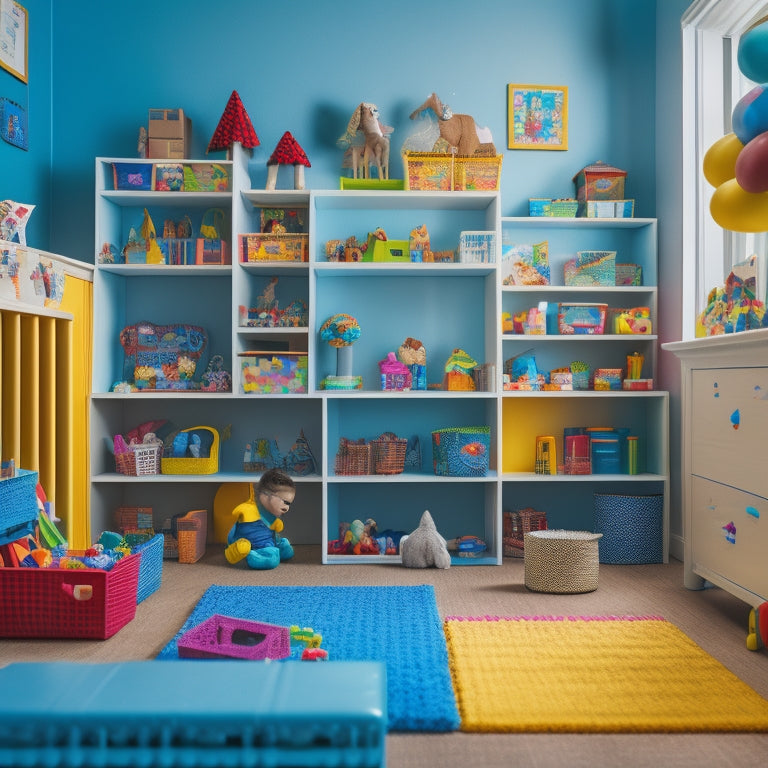
Engaging Games Teach Kids Organization Skills Fast
Share
I've found that engaging games can quickly teach kids organization skills, and it's not just about fun and games! Games like Pickup Sticks, Hedbanz, and Sort It Out help develop critical thinking, problem-solving, and spatial awareness. Brain teasers and puzzles like Kanoodle and Uzzle take it a step further, enhancing spatial reasoning and critical thinking skills. Even life skills simulation games like The Game of Life teach problem-solving and decision-making. By incorporating these games into playtime, I've seen kids develop essential organizational habits - and there's more to explore when it comes to taking their skills to the next level.
Key Takeaways
• Engaging games like Pickup Sticks, Hedbanz, and Mousetrap teach fine motor skills, analytical thinking, and spatial organization.
• Brain teasers and puzzles like Kanoodle and Uzzle enhance problem-solving skills, spatial reasoning, and critical thinking.
• Games simulating life events, such as The Game of Life, teach problem-solving, decision-making, and consideration of consequences.
• Parental involvement and simple tools like schedules and categorization help kids develop organizational habits and effective time management.
• Incorporating games and activities into daily routines fosters independence, organization, and critical thinking skills in kids.
Games for Organizing Skills
I've found that engaging games like Pickup Sticks, Hedbanz, Mousetrap, Tetris, and Sort It Out can be a fun and effective way to teach kids essential organization skills. These interactive challenges offer more than just entertainment - they're skill-building activities that help develop critical thinking, problem-solving, and spatial awareness.
Through Pickup Sticks, kids learn fine motor skills and cause-and-effect relationships. Hedbanz promotes analytical thinking and categorization. Mousetrap and Tetris encourage spatial organization and creativity. Sort It Out helps kids develop categorization skills and think logically.
Brain Teasers and Puzzles
Brain teasers and puzzles, such as Kanoodle 3-D Brain Teaser Puzzle Game and Uzzle Board Game, challenge kids to think critically and develop problem-solving skills, helping them become more adept at tackling complex tasks and making informed decisions.
As I engage my kids with these brain teasers, I see their spatial reasoning and critical thinking skills improve dramatically. They learn to visualize and manipulate objects mentally, making connections between seemingly unrelated pieces.
These skills are essential for organization, as they enable kids to break down complex tasks into manageable chunks and prioritize their actions. By incorporating brain teasers and puzzles into our daily routine, I'm confident my kids will develop the problem-solving skills they need to succeed in school and beyond.
Life Skills and Decision Making
As my kids navigate the ups and downs of childhood, I've come to realize that teaching them life skills and decision-making strategies is essential for their future success. That's why I incorporate games that simulate life events and encourage critical thinking exercises into our daily routine.
One of my favorite tools is The Game of Life Board Game, which presents players with real-life scenarios and asks them to make decisions that impact their virtual lives. This life events simulation helps my kids develop problem-solving skills and think critically about the consequences of their choices.
Organizing Tips and Tools
Daily, I find myself searching for ways to help my kids develop good organizational habits, and that's where these practical tips and tools come in handy.
As a parent, I know that kids' playtime is an ideal opportunity to instill organizational skills. I make sure to involve myself in their daily routines, guiding them to sort toys and objects into categories.
I also teach them to create a schedule for their schoolwork and chores, helping them prioritize tasks and manage their time effectively. By incorporating these simple yet effective tools and tips into our daily lives, my kids are learning to become more organized and independent.
Parental involvement is key, and with these strategies, I'm confident my kids will develop the skills they need to succeed.
Frequently Asked Questions
How Do I Motivate My Child to Practice Organization Skills Daily?
As I coincidentally stumbled upon my own childhood journal, I realized I need to model a daily routine for my child, exercising parental patience to foster their organization skills, making it a habit that sticks.
Can Board Games Really Improve My Child's Academic Performance?
I'm convinced that board games can boost my child's academic performance, meeting my expectations; they enhance critical thinking, problem-solving, and spatial reasoning, translating to improved grades and a stronger work ethic.
Are There Organization Games Suitable for Children With Special Needs?
As a parent, I seek inclusive play options for my child with special needs, and I'm thrilled to find adaptive tools like Kanoodle's tactile puzzle pieces and Pop It Fidget Toys, which facilitate organization skills development in a fun, accessible way.
How Long Will It Take to See Results From Using Organization Games?
As I navigate the journey of teaching kids organization skills, I find myself wondering, "How long until the puzzle pieces of progress fall into place?" Consistency matters; tracking progress is key - with patience, I'll soon see the fruits of our labor bloom.
Can I Adapt Organization Games for Use With Multiple Children at Once?
I adapt organization games for multiple kids by embracing Classroom Chaos and leveraging Group Dynamics, dividing them into smaller teams to promote collaboration, communication, and healthy competition, making learning fun and efficient.